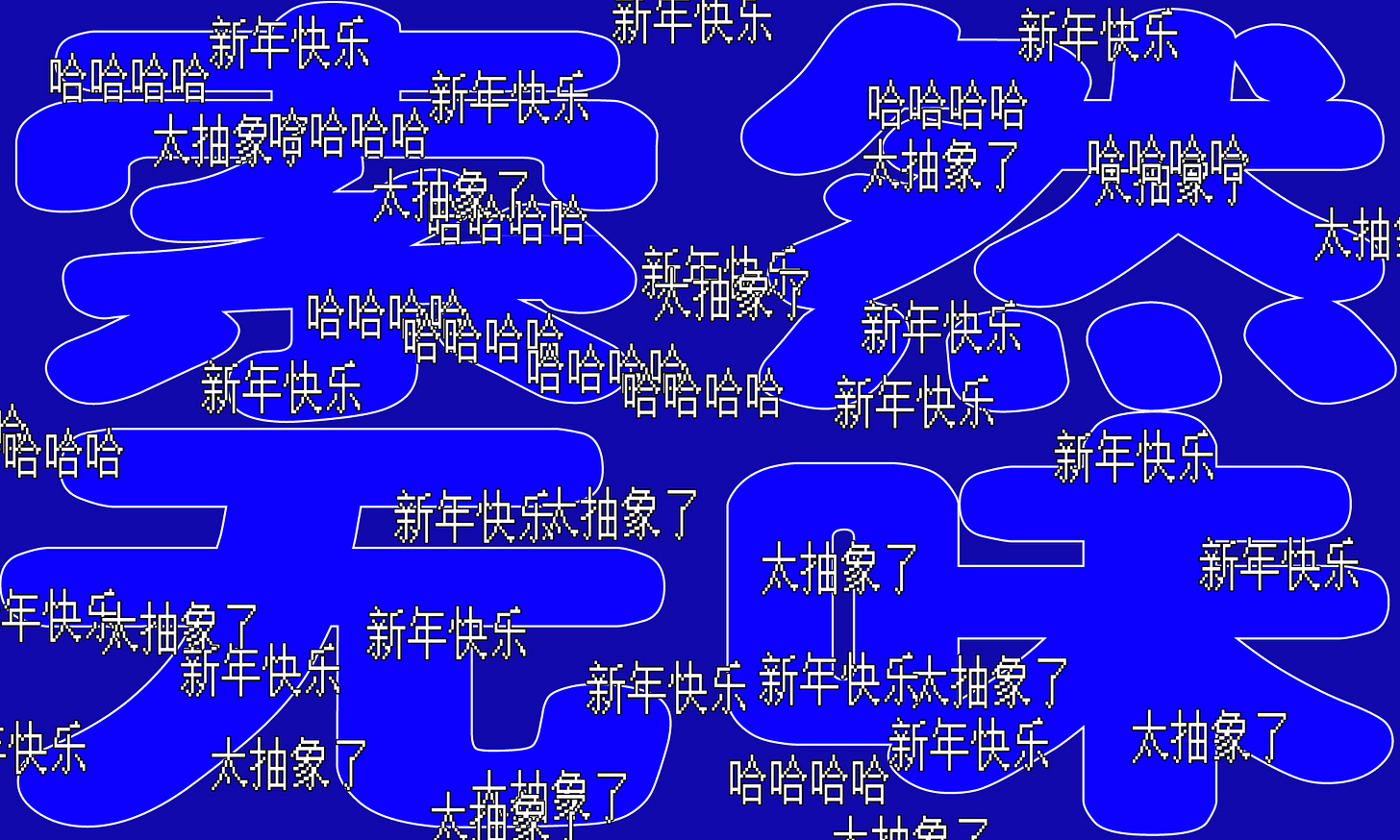"Dull" — Phrase of the Week
On-screen comments during Spring Festival Gala disappoint

Our phrase of the week is: "dull" (索然无味 suǒrán wúwèi)
Context
The Spring Festival Gala (春晚) is China's biggest annual TV event, broadcast on state TV on Chinese New Year's Eve. It features music, dance, comedy, and cultural performances, all carefully curated to align with official propaganda narratives.
Video-sharing platform, Bilibili (哔哩哔哩 or B站), secured the rights to live-stream the Gala for the first time, beating other social media platforms to it, like WeChat, Youku, and Douyin.
Popular among young audiences in China, Bilibili is known for its interactive “bullet comments” or danmu (弹幕 dànmù) feature, where real-time user comments scroll across the screen from right to left.
So on announcing it had won the live-stream rights for the Gala, Bilibili's campaign focussed on this community feature, with the slogan:
"Watch the Spring Festival Gala with 300 million young people"
和3亿年轻人一起看春晚。
hé sān yì niánqīngrén yīqǐ kàn chūnwǎn
This created high levels of anticipation among its young user base, as an opportunity to engage directly with other viewers. However, excitement quickly turned to disappointment when users realised that comments were restricted, with only a limited set of pre-set short messages allowed, such as “hahahaha” (哈哈哈哈), "so surreal" (太抽象了), and "Happy New Year!” (新年快乐).
To make matters worse, there were technical glitches throughout the broadcast.
Disappointed users took to social media to express their frustration:
The platform also claimed that pre-set bullet comments could make it more interactive, fun and lively.
However, in reality, they made the entire Spring Festival Gala live stream dull, where these cold, pre-programmed comments extinguished everyone's enthusiasm.
平台还声称预制弹幕能增加互动性和趣味性,营造活跃氛围,可实际情况却是,它让整个春晚直播变得索然无味,大家的热情被这冰冷的预制弹幕浇灭。
Píngtái hái shēngchēng yùzhì dànmù néng zēngjiā hùdòngxìng hé qùwèixìng, yíngzào huóyuè fēnwéi, kě shíjì qíngkuàng què shì, tā ràng zhěngge Chūnwǎn zhíbò biàndé suǒrán wúwèi, dàjiā de rèqíng bèi zhè bīnglěng de yùzhì dànmù jiāomiè.
And with that, we have our Sinica Phrase of the Week!
What it means
“Dull” is a four-character idiom, which translates directly as “uninteresting” (索然 suǒ rán), and “lacking flavor” (无味 wú wèi).
The idiom dates back to the Ming Dynasty (1368–1644), attributed to Yáng Shèn 杨慎, a prominent scholar and poet of that period.
It first appears in Miscellaneous Records of Danqian: Discussions and Evaluations (丹铅杂录·论衡), a literary collection by Yang, written in the mid-1500’s. The work includes essays, historical commentary, and literary critiques.
The phrase first appears in this passage:
Indeed, it is considered skillful writing in being implicit and not saying everything outright. If everything is fully explained, it becomes dull and flavorless.
盖文有以含蓄不尽为工者。说尽,则索然无味。
Gài wén yǒu yǐ hánxù bú jìn wéi gōng zhě. Shuō jìn, zé suǒrán wúwèi.
It’s apt that Yang’s definition of “dull” was a certain style of writing. What he describes as dull is “everything is explained in full”.
In modern Chinese, the idiom can be translated as "boring", "uninteresting" or “dull”.
That’s certainly what some critics of Bilibili believe about their self-censoring of danmu comments during the Spring Festival Gala.
Andrew Methven is the author of RealTime Mandarin, a resource to help you learn contemporary Chinese in context, and stay on top of the latest language trends in China.
Read more about how this story is being discussed in the Chinese media in this week’s RealTime Mandarin.



